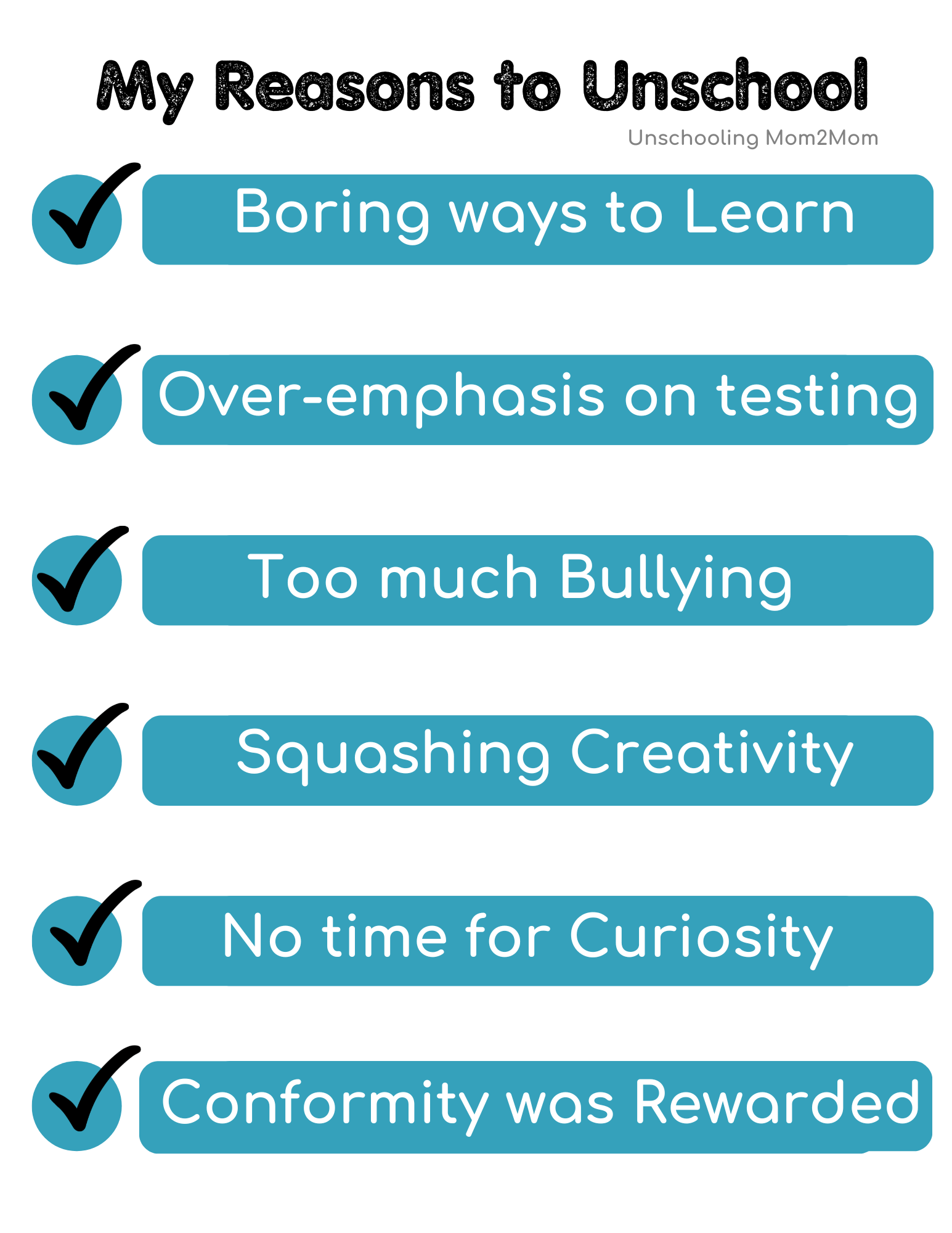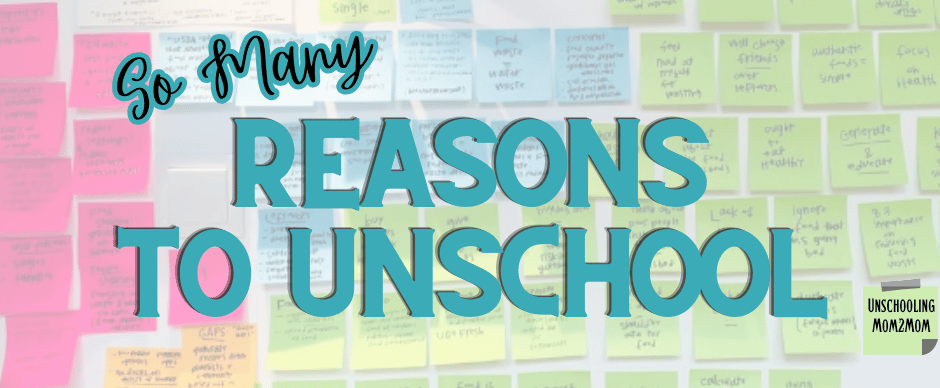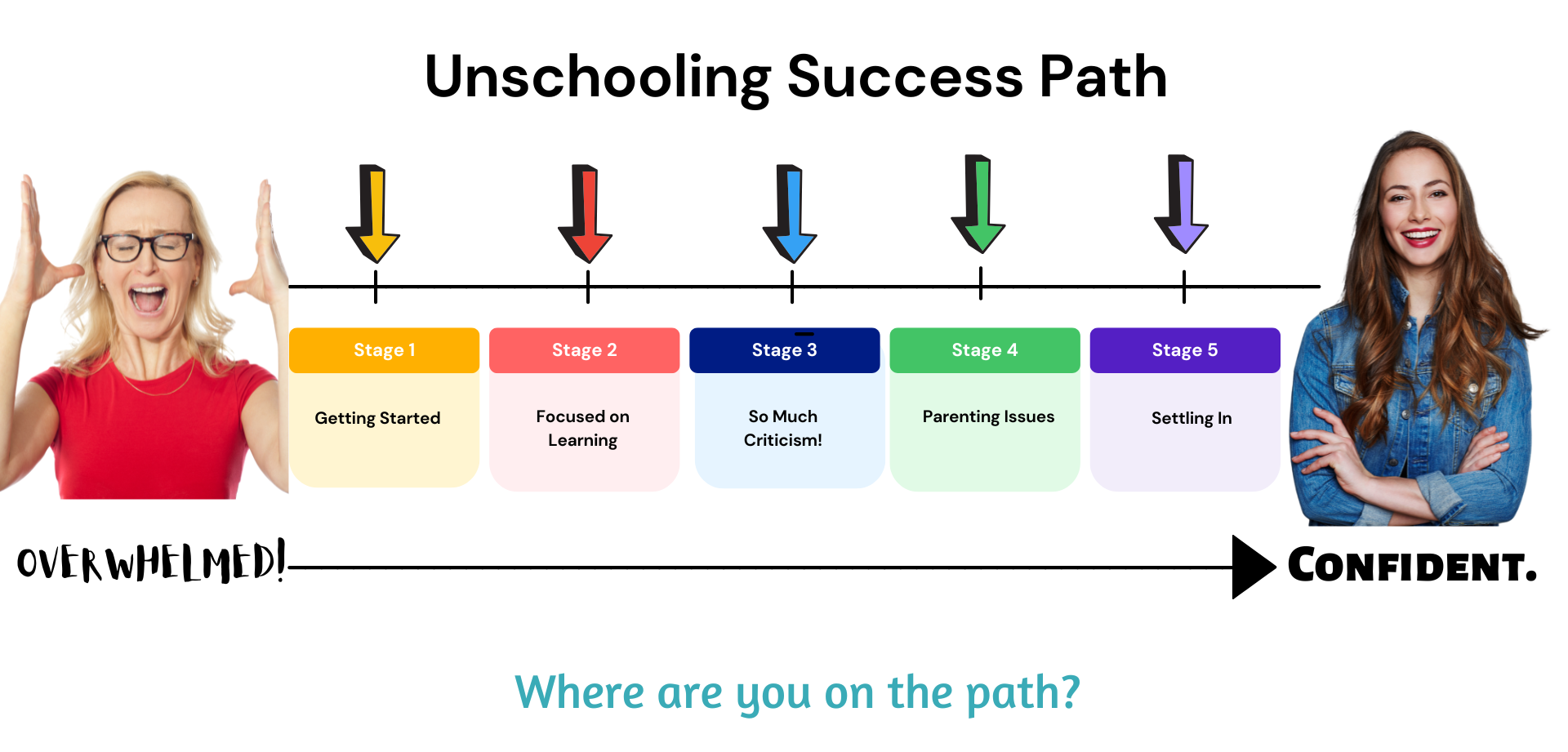Why Did YOU Start Unschooling?
Families choose to unschool for soo many reasons! Here are a few that I've heard over the last couple of decades:
- Children have much more time to spend pursuing their interests.
- Children will avoid the compete and compare attitude that is so prevalent in schools.
- Families control their calendar - they can take trips at "non-peak" times of the year.
- Children can take longer or dive in deeper if they're interested in the topic.
- Children can learn more quickly when it comes to them easily and is in context with their activities.
- Shame and humiliation will not be used to motivate children as they are in schools.
- Children will be more willing to take risks and be creative since they do not have to worry about being critiqued.
- Children can grow with internal motivations instead of doing tasks for a grade, a gold star, or teacher approval.
- Children won't have to shelve their interests and believe they are "less than" so they can complete the work that someone else says matters more.
- Children have time to daydream/ponder without bells or thought disruptions prioritizing schedules over learners.
- Children can learn topics that are not on the "plan" for this particular school year. They don't have to wait until it's scheduled into the scope and sequence for a particular grade.
- Children will see adults in their world as people who can help them as opposed to the enemy they have to work around.
- Families can go out into their community as often as they like to pursue interests or explore. "Field trips" can happen multiple times every week!
- Families don't have to take the leftovers of kids' time after school is out. By then, they're worn out - yet still need to do homework, relax, and have any little bit for family time.
15. Children can take longer or dive in deeper if they're interested in the topic.
16. Children can choose their own pace for learning... anything.
17. Children will see that there are a multitude of ways to learn anything.
18. Children will experience less peer pressure.
19. Children will expeiernce less bullying.
20. Children can avoid mindless busywork.
21. Children will not have to waste years doing "test prep."
22. Children can concentrate without constant distractions.
23. Families have more time together.
24. Families have time to share real life skills.
25. Families can create traditions and special days to celebrate.
26. Children will have time to pursue more non-academic interests (music/art).
27. Learning will be at more appropriate levels - more challenging, less busywork.

28. Children can learn topics that are not on the "plan" for this particular school year. They don't have to wait until it's scheduled into the scope and sequence for a particular grade.
29. Children will see failures as simply data to use for adjustments - not the humiliating effect that it can have in a classroom.
30. Children will have less pressure to grow up quickly in terms of clothing styles, music, language, sex, etc.
31. Social interactions with others will be by choice and based on having common interests. Social interactions will be more varied, not just with the child's chronological age peer group.
32. Field trips can be taken on a much more frequent basis and can be more productive when not taken with such large school groups. For example, on a trip to a nature center, the children can choose to spend several hours identifying birds or plants. On a school field trip, this would be impossible. Field trips can be more connected to the child's own curriculum.
33. Volunteer service activities can be included in the family's regular schedule. Community service is of tremendous importance in a child's overall development as well as a learning experience.
34. Scheduling can be flexible, allowing travel during less expensive and less crowded off peak times. This can allow for more travel which is wonderful experience.
35. Children will be less likely to constantly compare their knowledge or intelligence with other children and will be less tempted to become conceited about their abilities.
36. Religious and family special days can be planned and celebrated.
37. Children will bond more with their siblings since they will spend more time together when they are not stressed and tired out from school. They will discover that they can work together and help each other.
38. The children can get immediate and appropriate feedback on their work - no waiting for the teacher (or a parent classroom volunteer or even another student) to grade and return their work to find out if they understood it correctly. Feedback can be much more useful; specific and child-appropriate comments rather than a letter grade or the generic super or great work, etc.
39. Time does not have to be spent on test taking at all unless it is something the child wants to do. In a classroom, testing is the way the teacher finds out how much the students have learned. Observation and discussion are ongoing at home, tests are unnecessary. Tests can be used by the child to see how much she recalls and to determine what to study next. Grades are unnecessary and there is no comparison of test results.
40. Grades become of no importance and learning is motivating in and of itself. Understanding and knowledge are the rewards for studying, rather than grades (or stickers, or teachers praise or. . .)
41. Children can be consistently guided in our family's values and can learn from seeing and participating in parents' daily life.
42. Skills and concepts can be introduced when the child is ready for them. She does not have to wait until a certain grade level for learning something which she is interested in and ready for right now.
43. Children will learn how to devote their energies and time to activities they think are worth it. The children can have long, uninterrupted blocks of time to write, read, think or work on a activity. Creativity and serious in-depth study are discouraged in a classroom where there is a lot of noise, a schedule designed for keeping every child busy and continuous interruptions.
44. Children can spend a lot more time outdoors (even reading, writing, or studying) which is more healthy physically and mentally than spending most of their weekdays indoors in a crowded (often overheated) classroom.
45. Children will help more with household chores, learning skills (cooking, cleaning, etc.) as well as becoming more responsible.
More household responsibility develops a stronger family bond because working for the family is an investment in the family. People become committed to things in which they invest.
46. The child can be more in touch with the changes of the seasons, and the miracles of nature if more time is spent outside.
47. Children will become more responsible for their own education. They will not be passive recipients of subject matter selected by their teachers (actually administrators or government committees), but will at least have input into designing their own education and eventually take over full responsibility.
48. Children will realize that learning can take place in a large variety of ways. They will learn to seek out assistance when needed from many alternative sources; not just rely on a classroom teacher to provide all the answers.
49. Families can experience a more relaxed, less hectic lifestyle when we will stop trying to supplement "enrichment activities" (Life!) during after-school and week-end hours. No after-school homework to interrupt.
50. Children will not be as tempted to take the easy way out by doing just enough to satisfy their teacher. They will be the judge of the quality of their work.
51. Learning can be more efficient with children learning the best methods for their own learning styles.They do not need each piece of information to be taught through various methods that are needed by children who have other learning styles.
52. The children will experience much less frustration by not having to constantly work in groups with other children who do not learn as easily or quickly, do not share their enthusiasm and love of learning, have uncooperative attitudes and do not willingly do their share of group work.
53. Children will work and learn for internal self satisfaction more than for external reward.
54. Children can learn about real world issues as they are occurring in real time.
55. Children can learn more abou their own community, participating in community service and making a difference.
56. Children will be more willing to take risks and be creative since they do not have to worry about being critiqued.
57. Children can learn at their own pace without feeling pressure to "keep up" or "slow down" based on the class average.
58. Children can make friends based upon shared interests instead of desk proximity or sharing a birth year.
59. Children can follow a more natural sleep schedule, changing as they get older or as their calendar dictates.
60. Families can have more shared experiences, creating closer connections and happier childhood memories together.











